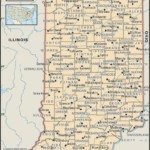First explored for France by Robert Cavelier, Sieur de la Salle, in 1679–1680, the region figured importantly in the Franco-British struggle for North America that culminated with British victory in 1763.
George Rogers Clark led American forces against the British in the area during the Revolutionary War and, prior to becoming a state, Indiana was the scene of frequent Indian uprisings until the victories of Gen. Anthony Wayne at Fallen Timbers in 1794 and Gen. William Henry Harrison at Tippecanoe in 1811.
After the Revolutionary War ended, several tribes of Native Americans kept trading with French people. Many of those tribes moved to the Mississippi River’s west side. Soon, settlers and land speculators also moved out west, despite the proclamation that prohibited that expansion. In 1787 what is now Indiana became part of Northwest Territory. All of what is now Indiana and part of what is now Illinois became Knox County. For the next two decades, Native American conflicts increased and jurisdictions in Northwest Territory changed quite a bit.
The Indiana Territory, was organized on May 7, 1800. The State of Indiana was created as the 19th state on December 11, 1816. The State of Indiana is bordered by Michigan, Illinois, Ohio and Kentucky. The capital is Indianapolis and the official state website is http://www.in.gov/. It has 92 Counties.
Select a Indiana county to view information & records pertaining to each County
Indiana Genealogy Record Guides
How to Search for Indiana Genealogy Data
Indiana is among the Midwestern states that have seen a huge amount of “traffic” as the United States grew and expanded. Because of this, there is a large demand for information relating to the genealogy of those who passed through or settled in this primarily agricultural region. Today, there is an impressive array of resources for Indiana genealogy researchers available.
Effective Methods to Use for Indiana Genealogy – Many researchers quickly discover that, in their search for Indiana genealogy data, they can use many of the state’s online resources to begin acquiring facts and copies of the materials they need. Just because there are so many resources online, however, it does not imply that all of the information has been put online.
We already mentioned that Indiana is well ahead of many other states in terms of digitizing a large number of archives, but there are still many groups that have not yet been able to afford to tackle such a project. This means that anyone doing research for an Indiana genealogy project will also have to familiarize themselves with offline locations that will be of use to their efforts. It is extremely useful for genealogists to familiarize themselves with the tools to use for Indiana genealogy, and how to understand which are online resources, and which are not.
A Totally Modern Approach for Indiana Genealogy – Public records easily qualify as some of the most frequently used resources for Indiana genealogy, and they are found in the following categories:
- Vital Records – these will always cover the basic birth, marriage, divorce, and death records from county, state, and national archives. These might also contain newspaper items, military records, immigration and naturalization details, cemetery or obituary information, census records, and passenger lists and records as well. These are going to be available as online or offline resources for Indiana genealogy.
- State Records – from probate information to surname lists, state census information, private manuscripts, newspapers, military or veterans information, marriage details, maps, land records, genealogical folders, estate information, deeds, death records, cemetery information, birth certificates and more; such records are available as online and offline resources for Indiana genealogy.
- Local Records – state research tends to begin in a county clerk’s office or website, and then moves on to the small local libraries, historical societies, local genealogical societies, and school or college libraries for Indiana genealogy data. These are materials that are usually offline and viewable by appointment or special arrangement.
Strong and Effective Tools for Indiana Genealogy – As a modern researcher, you will need to learn which tools work for Indiana genealogy, and which provide you with the most information for your particular project. Below we have indicated some of the strongest for Indiana genealogy, and which will be found in person or online at:
- Vital Records, Indiana State Department of Health, P.O. Box 7125, Indianapolis, IN 46206-7125; Website: http://www.cdc.gov/nchs/w2w/indiana.htm . This is where anyone can order birth, death, marriage and divorce records via a written request or even online.
Additional state and local records can be found at the:
- Indiana State Archives, 6440 East 30th Street, Indianapolis, IN 46219; Website: http://www.in.gov/icpr/2358.htm . Indiana is going to great lengths to get their archives online. They have a very progressive group of organizations and individuals (including more than six partner states) working to get historical and genealogical data available to the public via the Internet.
Indiana Genealogy Databases and other Helpful Links
Finally, these websites provide a tremendous amount of state-specific details to those in search of facts for Indiana genealogy projects.










